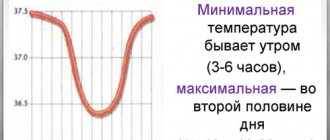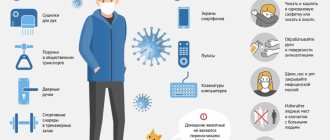Thermoregulation in the body
For normal human life it is necessary that heat exchange be carried out constantly. It depends on the characteristics of the organism and on the presence of various reflex stimuli, and changes can have an effect even if the ambient temperature remains unchanged.
Violation of thermoregulation
First of all, such violations can occur as a result of exposure to external or internal factors. For example, internal diseases include various types of diseases.
The main symptoms can be considered:
- chills;
- chills, as a result of hyperkinesis - when involuntary muscle contractions occur;
- as a result of hypothermia - the consequences of hypothermia;
- as a consequence of hyperthermia - in case of overheating of the body.
The main causes of thermoregulation disorders are:
- congenital or acquired defect of the hypothalamus. It can negatively affect the functioning of many internal organs, including body temperature itself;
- climate change. This external factor is capable of influencing body temperature as a result of adaptation of the body;
- alcohol abuse;
- a consequence of processes associated with aging;
- various mental disorders.
How to restore normal temperature while sleeping
To restore normal thermoregulation, experts advise:
- Lead a healthy lifestyle with moderate exercise and proper balanced nutrition.
- Get rid of bad habits - smoking, alcohol abuse - any intoxication contributes to disruption of thermoregulation and hormonal imbalances.
- Eliminate or regularly treat all existing foci of infection in a timely manner.
- Avoid high emotional stress and prolonged stress.
- If there is a long-term persistent violation of daily thermoregulation, consult a doctor for an examination.
- Ventilate the room before going to bed; thermoregulation centers work more actively at 19 - 18°C; Night hormones are more actively produced and substances necessary for the body are synthesized.
- The optimal time for going to bed is 23:00: at this time, a large amount of the sleep hormone melatonin is produced in the blood, which also helps restore the body.
- Use bedding made from natural fabrics that absorb sweat well.
Night sleep should last at least 8 hours - this is how much time is required for the body to fully recover.
A persistent increase or decrease in night temperature signals a malfunction in the body. Over time, this can lead to serious problems. It is much easier to identify and treat such a disease in the early stages.
Increased body temperature
One of the serious signs of pathology in the body is an increase in body temperature. If numbers between 36.5 - 36.9 C are considered normal, then its rise is a signal from the body that an infection or virus has entered it and inflammation has begun. Doctors recommend treating this symptom as:
- the ability of your immune system to begin fighting various irritants;
- about the onset of various disturbances in the normal functioning of internal organs, as well as body tissues.
It is for this reason that it is worth considering the various factors and causes of body temperature fluctuations.
Causes of elevated body temperature
If you have a fever, do not immediately panic and start swallowing pills or calling a doctor. It is worth knowing that some causes of elevated temperature do not pose a danger to humans. Let's look at what you should pay attention to.
Non-dangerous causes include symptoms that will go away on their own:
- if the temperature rise occurs in the evening. Very often, it is at this time that it can rise 0.5-1 degrees above normal;
- as a result of emotional or physical stress. They will increase blood circulation, and with it heat exchange will increase;
- during ovulation in women. Often before the start of the menstrual cycle, hormonal surges are possible, and with this the body temperature rises;
- as a consequence of thermal loads. The presence of a body temperature of 37 and above can manifest itself as a result of eating hot food, visiting a bathhouse or sauna, taking a bath, or after sunbathing.
And now it’s worth talking about the pathological causes that can cause dangerous diseases:
- development of acute or chronic infections;
- various viral diseases, including influenza or ARVI;
- all cases of inflammation or swelling;
- for diseases of the respiratory system;
- if there are disorders of the thyroid gland;
- in case of injury to joints and muscles;
- during the course of a sexually transmitted disease.
Symptoms of elevated body temperature
It is worth saying that a significant increase in temperature will be felt by the person himself. The main symptoms include:
- feeling tired and weak;
- chills appear. Moreover, the greater the heat, the stronger the chill will be;
- the appearance of headache;
- the appearance of body aches. The joints, muscles and fingers are most often affected;
- the person begins to feel cold;
- burning and dry eyes appear;
- the mouth feels dry;
- Appetite may decrease or disappear altogether;
- increased heart rate, arrhythmia may appear;
- sweating increases or, conversely, dry skin.
How and when to bring down a high fever in an adult
Body temperature above 38.5C should be of particular concern. And yet, doctors recommend starting to bring down the temperature with medications when it reaches 38C.
But you should focus, first of all, on your general well-being. If the high temperature is poorly tolerated, unbearable aches, chills, confusion, physical discomfort, vomiting, dizziness are felt, then the temperature should be brought down immediately.
But it also happens that even a high temperature occurs with barely noticeable discomfort, then you should focus on the thermometer mark and, if it exceeds 38.5, take an antipyretic drug.
During fever and throughout the entire period of illness, it is important to drink as much fluid as possible. Through the excretory system, it promotes the rapid elimination of bacteria and viruses and their metabolic products - toxins. As a result, you will recover faster from a high temperature.
If there is a need to bring down the temperature, it is worth adding antipyretic drugs. It is better to give preference to single-component products. Adults are recommended to take paracetamol or ibuprofen based products. The use of multicomponent drugs, where paracetamol or ibuprofen are only part of the composition, should be used in extreme cases. And even more so, exclude the joint use of both.
Temperature of a sleeping child
In children, the differences are more pronounced, since they have a higher metabolic rate. Therefore, a child’s temperature may drop during sleep. But sometimes it increases, which is more common in very emotional children.
In newborns, the temperature is higher due to impaired thermoregulation and limited sweating. After birth, within 4 days it reaches 37.2°, and then decreases to 37°. In the first 10 days of life there are no daily fluctuations, but then they gradually begin to increase and amount to:
- at 4 weeks 0.4 – 0.5°;
- at 8 weeks 0.5 – 0.6°;
- in six months 0.8 – 1.2°;
- at 12 months – 1.5°.
Premature newborns are characterized by temperature fluctuations that are not related to the time of day.
What not to do at high temperatures
You should react to an elevated temperature without panic, but with special care.
It is not recommended to bring it down in the first minutes after the increase; you need to let the body cope with the temperature on its own. At this time, the body’s defenses are mobilized and pathogens of various diseases die. But even when lowering the temperature, you should not strive for 36.6. In the first days of illness, this is unlikely to be achieved. Rubbing, especially with vinegar or alcohol solutions, is not recommended. However, this practice still exists at home. If a patient with a high fever is pale and his limbs are cold to the touch (so-called white hyperthermia), then any rubbing is contraindicated for him and, in addition to antipyretics, antispasmodics are recommended. The fact is that cold extremities are caused by vasospasm. And in this case, cold rubbing with vinegar or alcohol-containing liquids can only worsen the situation with the blood vessels.
Wiping with vinegar is not indicated for adults and children with respiratory manifestations of the disease or chronic pathologies of the respiratory system. Vapors can worsen the patient's condition and affect the breathing process. Also, intolerance to vinegar or alcohol, as well as the presence of damage and irritation of the skin, are contraindications to rubbing.
At high temperatures, it is not recommended to eat rich, fatty foods and sugar. An increase in glucose levels in the body reduces the number of white blood cells, which are responsible for destroying infected cells. Which can harm the process of fighting bacteria and viruses. And fatty foods create additional stress on digestion and the body devotes some of its energy to this process, instead of fighting the enemy.
Speaking about drinking liquid at a fever, it should be noted that hot drinking is strictly contraindicated! Especially coffee. Caffeine causes dehydration. A hot drink warms up the body even more. Only warm fruit drinks and herbal teas.
When do you need to take antipyretics?
Regardless of what level the thermometer has risen to, it is necessary to reduce the temperature with the help of antipyretic drugs:
- people with disorders of the central nervous system;
- children with a history of febrile seizures;
- patients with epilepsy.
Studies have shown that patients at risk should take thermoregulatory medications, since any overheating of the brain can lead to serious complications.
People with unimpaired functioning of the central nervous system should reduce their temperature with medication if it rises to 39˚C. From this mark begins a dangerous zone of values that can cause irreparable damage to the brain. At temperatures above 39˚C, protein begins to disintegrate, which means brain cells are irreversibly destroyed.
Reduced body temperature
Like high temperatures, low temperatures also indicate problems. Especially if it lasts for a long time. This leads to rapid fatigue, loss of mood, weakness of the body, etc.
Causes of low body temperature
A decrease in temperature is observed:
- with low hemoglobin;
- in case of internal bleeding;
- during pregnancy;
- if there are problems with blood vessels;
- for diabetes;
- with pathology of the adrenal glands;
- during brain tumors;
- with asthenic syndrome;
- during skin lesions;
- as a result of seasonal ARVI;
- in case of intoxication;
- as a consequence of hypothermia;
- with hypothermia.
Symptoms of low body temperature
Symptoms include:
- weakness;
- drowsiness;
- apathy;
- chills;
- feeling of cold.
Causes
Temperature rises due to overwork
Evening temperature can also occur against the background of daytime overwork, too busy a day. The body rests after this, everything will be fine by morning.
When the temperature rises in the evening, in addition to overwork, more serious things can become its causes:
- exhaustion, chronic fatigue;
- weakened immune system after illness;
- onset of a cold;
- inflammatory processes.
Considering that in the evening our immune system begins to weaken, this is why our body temperature increases. With regular lack of sleep or severe exhaustion, as well as after a difficult illness, our immune system is extremely vulnerable. Recovery will be facilitated by quality rest and vitamins. Don't forget about fresh air.









